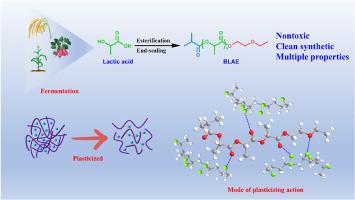当前位置:
X-MOL 学术
›
J. Clean. Prod.
›
论文详情
Our official English website, www.x-mol.net, welcomes your feedback! (Note: you will need to create a separate account there.)
Synthesis, characterization and performance evaluation of a nontoxic functional plasticizer for poly(vinyl chloride) derived from sustainable lactic acid
Journal of Cleaner Production ( IF 11.1 ) Pub Date : 2024-03-24 , DOI: 10.1016/j.jclepro.2024.141895 Bingfeng Qian , Panpan Peng , Chenliang Wang , Lijie Wang , Jianan Zhang , Mingyuan Wu , Jiuyi Liu , Qingyun Wu , Jianjun Yang
Journal of Cleaner Production ( IF 11.1 ) Pub Date : 2024-03-24 , DOI: 10.1016/j.jclepro.2024.141895 Bingfeng Qian , Panpan Peng , Chenliang Wang , Lijie Wang , Jianan Zhang , Mingyuan Wu , Jiuyi Liu , Qingyun Wu , Jianjun Yang

|
The use of plasticizers is crucial in enhancing the flexibility of engineering plastics. Currently, the primary plasticizers employed in poly(vinyl chloride) materials are nonrenewable phthalates. These exhibit a detrimental impact on the environment and human health owing to their toxic benzene ring structure. Consequently, the development of easily synthesizable, green plasticizers with excellent properties using biobased resources has been a long-standing objective in the field of resin plasticizing. Herein, we synthesized a branched lactic acid ester (BLAE) plasticizer using esterification and acid anhydride end-capping methods. Further, we investigated its application performance and oral toxicity. The abundance of polar ester groups in the oligolactic acid structure enables them to form secondary bonds with polymer chains. This results in a glass transition temperature is 59% less than that of pure poly(vinyl chloride), thereby improving the mechanical properties of the material. The addition of the BLAE plasticizer not only improved the thermal stability of the compound film but also effectively reduced the self-catalytic dehydrochlorination reaction of poly(vinyl chloride). This overcomes the limitations of unmodified poly(vinyl chloride), such as performance deterioration and color variation due to light exposure. Furthermore, the hydrophobicity of the compound film was substantially enhanced, resulting in outstanding antifouling and self-cleaning properties. These findings suggest that lactic acid-based plasticizer exhibits comparable or even superior overall performance when compared to commercially available plasticizers such as dioctyl phthalate and acetyl tributyl citrate. This work not only addresses the gap in the toxicity assessment of lactic acid plasticizers but also demonstrates their nontoxic characteristics in acute oral toxicity tests. This research offers novel insights into the green synthesis and functional development of biobased plasticizers, showcasing considerable potential for the substituting of dioctyl phthalate.
中文翻译:

可持续乳酸衍生的无毒功能性聚氯乙烯增塑剂的合成、表征和性能评价
增塑剂的使用对于增强工程塑料的柔韧性至关重要。目前,聚氯乙烯材料中使用的主要增塑剂是不可再生的邻苯二甲酸酯。由于其有毒的苯环结构,它们对环境和人类健康产生有害影响。因此,利用生物基资源开发易于合成、性能优异的绿色增塑剂一直是树脂增塑领域的长期目标。在此,我们采用酯化和酸酐封端的方法合成了支链乳酸酯(BLAE)增塑剂。此外,我们还研究了其应用性能和口服毒性。低聚乳酸结构中丰富的极性酯基团使其能够与聚合物链形成二级键。这导致玻璃化转变温度比纯聚氯乙烯低 59%,从而提高了材料的机械性能。 BLAE增塑剂的添加不仅提高了复合膜的热稳定性,而且有效减少了聚氯乙烯的自催化脱氯化氢反应。这克服了未改性聚氯乙烯的局限性,例如由于光照而导致性能下降和颜色变化。此外,复合膜的疏水性显着增强,具有优异的防污和自洁性能。这些发现表明,与市售增塑剂(例如邻苯二甲酸二辛酯和柠檬酸乙酰基三丁酯)相比,乳酸基增塑剂表现出相当甚至更优异的整体性能。这项工作不仅解决了乳酸增塑剂毒性评估的空白,而且在急性口服毒性试验中证明了其无毒特性。这项研究为生物基增塑剂的绿色合成和功能开发提供了新颖的见解,展示了替代邻苯二甲酸二辛酯的巨大潜力。
更新日期:2024-03-24
中文翻译:

可持续乳酸衍生的无毒功能性聚氯乙烯增塑剂的合成、表征和性能评价
增塑剂的使用对于增强工程塑料的柔韧性至关重要。目前,聚氯乙烯材料中使用的主要增塑剂是不可再生的邻苯二甲酸酯。由于其有毒的苯环结构,它们对环境和人类健康产生有害影响。因此,利用生物基资源开发易于合成、性能优异的绿色增塑剂一直是树脂增塑领域的长期目标。在此,我们采用酯化和酸酐封端的方法合成了支链乳酸酯(BLAE)增塑剂。此外,我们还研究了其应用性能和口服毒性。低聚乳酸结构中丰富的极性酯基团使其能够与聚合物链形成二级键。这导致玻璃化转变温度比纯聚氯乙烯低 59%,从而提高了材料的机械性能。 BLAE增塑剂的添加不仅提高了复合膜的热稳定性,而且有效减少了聚氯乙烯的自催化脱氯化氢反应。这克服了未改性聚氯乙烯的局限性,例如由于光照而导致性能下降和颜色变化。此外,复合膜的疏水性显着增强,具有优异的防污和自洁性能。这些发现表明,与市售增塑剂(例如邻苯二甲酸二辛酯和柠檬酸乙酰基三丁酯)相比,乳酸基增塑剂表现出相当甚至更优异的整体性能。这项工作不仅解决了乳酸增塑剂毒性评估的空白,而且在急性口服毒性试验中证明了其无毒特性。这项研究为生物基增塑剂的绿色合成和功能开发提供了新颖的见解,展示了替代邻苯二甲酸二辛酯的巨大潜力。



























 京公网安备 11010802027423号
京公网安备 11010802027423号